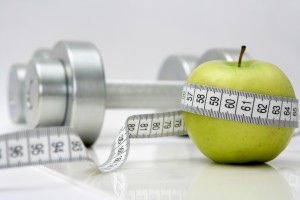Apples have been long heralded as a Power Food. In 1100 A.D., the Medical School of Salerno taught its budding physicians about the benefits of apples when treating illnesses of the lungs, bowels, and nervous system.
We all know about the “an apple a day, keeps the doctor away” phrase coined by J.T. Stinson in 1904.
What makes apples so good for you? Antioxidants, Low Impact Carbohydrates, and Fiber.
Antioxidant Power
Compared to other commonly eaten fruits in the U.S. – bananas, oranges, strawberries, and pineapples (to name a few) – apples have the second highest antioxidant activity (cranberries have the most).
A good deal of the antioxidant power is found in the peel (up to 6 times more antioxidants) and not the flesh.
There are many varieties of apples available, but Fuji and Red Delicious have been shown to have the highest levels of antioxidants.
Low Impact Carbs
As a carbohydrate source, apples are a great low impact carb, meaning they have a lower impact on your blood sugar levels compared to breads, grains, and cereals (some of the more common snack foods).
This is reflected in apples’ low glycemic index of only 38. The glycemic index is a rating that scientists give foods based on how fast they cause your blood sugar to rise (the highest score is 100). An example of food with a high glycemic index is white rice, which has a glycemic index of 72.
Low impact carbohydrates, like apples, are good carbohydrates to eat any time of day.
Fiber
One medium apple contains 4 grams of fiber. Apples contain a special soluble fiber called pectin. Pectin is one of the reasons that apples make you feel full after you eat them. Studies have also shown that pectin can decrease bad cholesterol levels.
Eat apples and eat them often.
The Perfect Snack
Apples are small, portable, and versatile; this makes them a perfect snack. They can be quickly paired with other complimentary foods for waistline friendly snacking. Pair a small apple with one of the following for a healthy snack on the go:
1-2 pieces of string cheese
A small handful of nuts (almonds, cashews, or pistachios)
Peanut butter – a classic snack that has been placed in children’s lunch boxes for decades – it is good for adults too.
These 3 snack options are nutritionally well-rounded as they contain low impact carbs, protein, fiber, and healthy fats.
The Dirty Dozen
Unfortunately, apples are a member of the Dirty Dozen. The Dirty Dozen is a list of the 12 fruits and vegetables that have been shown to have the highest levels of pesticides.
This doesn’t mean that you should stop eating apples. You can easily minimize your exposure to pesticides while still reaping the health benefits of apples.
Here’s how:
- Wash Thoroughly – Use soap and water or a fruit and vegetable wash like Fit or Environne. This will help remove the pesticides that have been sprayed on the outside of the apple.
- Peel the skin off the apple and discard it – I don’t recommend this because, as noted earlier, the skin of an apple contains high levels of health boosting antioxidants.
- Buy Organic – Many people are limited in the amount of organic foods that they can purchase due to their increased cost. However, if your budget allows you to purchase some organic foods, those on the Dirty Dozen list, like apples, should be your top priority.
Keep it Shiny
There are over 7,500 different varieties of apples. They all have different tastes and textures but one thing is universal. Always look for an apple that has a nice shiny skin. A dull colored skin means the apple won’t have the crispness and taste we have all grown to love.
To maintain the best possible taste and flavor, keep your apples in the refrigerator

